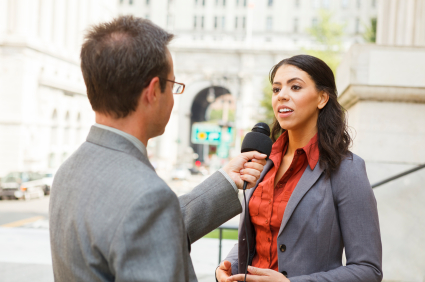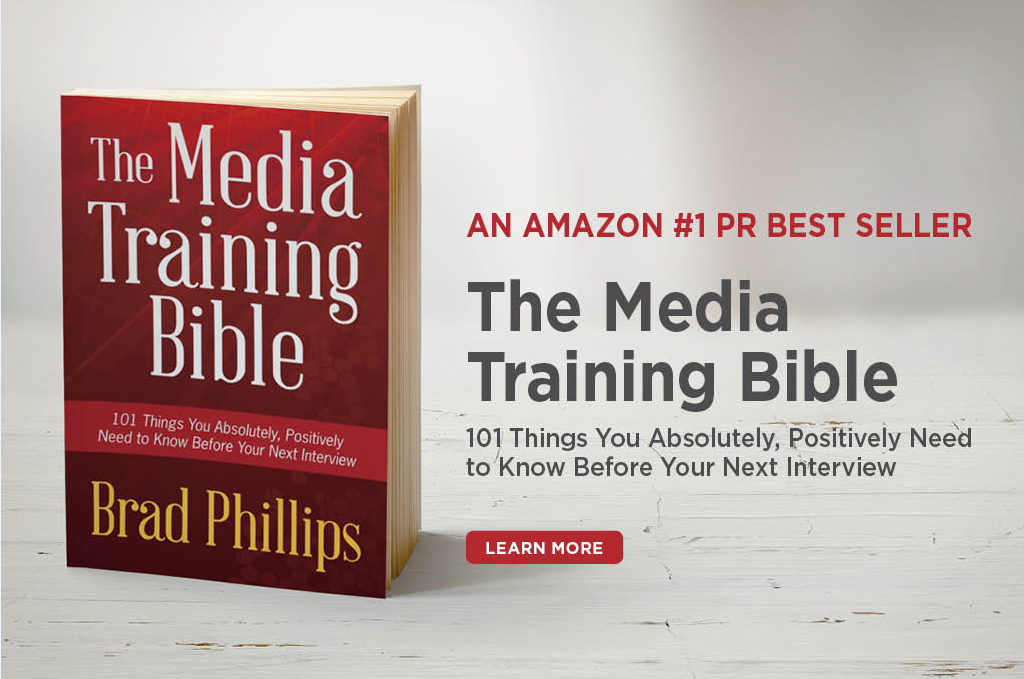Eight Questions To Ask Before Every Interview
This is an excerpt fromThe Media Training Bible: 101 Things You Absolutely, Positively Need to Know Before Your Next Interview, available in soft cover and all major e-book formats.
In lesson 2, I mentioned that you shouldn’t conduct an interview the moment reporters call. Instead, I advised that you should offer to return their calls promptly, and for you to take at least a few minutes to prepare for the interview before you speak.
But before you hang up from that initial phone call, take a few minutes to “interview” the reporter. Many journalists are willing to share the basics about the stories they’re working on, and any insight they offer will help you better prepare.

Below are eight questions you might consider asking reporters. I typically don’t ask all of these for every interview, since journalists don’t appreciate being grilled. But they’ll probably offer some of this information on their own anyway, so just fill in any gaps by asking the most relevant of these questions:
1. Who are you? No, you shouldn’t ask that question verbatim, but collect the basics—their name, the name of the news organization for which they work, and whether they cover a particular topic.
2. Can you tell me about the story you’re working on? Keep this question open-ended and remain quiet while the reporter speaks (the more they say, the more you’ll learn). Feel free to ask follow-up questions and to clarify any points you don’t fully understand.
3. Are you approaching this story from any particular perspective? Some reporters will bristle if you ask, “What’s your angle?” This question aims to elicit the same information in a more subtle manner.
4. Who else are you interviewing? Reporters often play it close to the vest on this one, but it’s worth asking. You’ll be able to get a sense of the story’s tone by learning whether the other sources in the story are friendly or antagonistic toward your cause.

5. What’s the format? For print interviews, this question will help you determine whether reporters just need a quick quote from you or whether they’re writing an in-depth piece that will focus extensively on your work. For broadcast interviews, you’ll be able to learn whether the interview will be live, live-to-tape, or edited. For television, you might also ask if the format will be a remote, on-set, or sound-bites interview.
6. What do you need from me? Ask the reporter how much time the interview will last and where the reporter wants to conduct the interview. Also, ask if you can provide any press releases, graphics, photos, videos, or other supplementary documents. You can often expand your presence in a news story—and influence the narrative—if the reporter chooses to use your supporting materials.
7. Who will be doing the interview? For many radio and television interviews, you will be contacted initially by an off-air producer rather than by an on-air personality. Ask for the name of the person conducting the interview.
8. When are you publishing or airing the story? Review the story as soon as it comes out. If it’s a positive story, share it with your online and off-line networks. If it’s a negative story, consider issuing a response or contacting the reporter or editor to discuss the coverage.
One final note: Before an interview, tell reporters how you prefer to be identified. Include your title and company name, and spell your full name. Nothing is worse than seeing your name or company’s name mangled in front of millions of viewers!
Like the blog? Read the book! The Media Training Bible: 101 Things You Absolutely, Positively Need to Know Before Your Next Interview is available in paperback, for Kindle, and iPad.



This is a great list. I’ve had very mixed results with reporters. Some reporters are super friendly and forthcoming and sometimes the additional context will be very helpful in making sure they get the type of information they are looking for. Other reporters are downright rude and sometimes the story can suffer as a result (i.e., they only want a very small piece of information, when a much larger contextual aspect would have been very helpful to the story, but we didn’t get it to them because they declined to provide the additional context). It’s not always the case, but I’ve definitely seen it go both ways.
Leslie – I’ve had a similar reaction from some journalists who bristle as well. I always try to make clear to them that I have no interest in trying to control their stories (they always have the ultimate power of the edit anyway), but rather in trying to help them locate the right spokesperson and make sure they have all of the relevant facts gathered to help the reporter.
Thanks for commenting!
Brad
Ah, I thought this was going to be questions to ask YOURSELF before going on an interview. For example: “If they ask about [the worst possible thing they could ask about], what will I say?”
Craig — Although this post wasn’t what you expected, I hope you enjoyed it anyway!
I’ve written many pieces about how to prepare for interviews from the perspective you mentioned. You’ll find many of them here in a post called “The 21 Most Essential Media Training Links.” I hope that helps!
Thanks for reading,
Brad
The most important part is preparing for crisis communication under severe stress, when these and other strategies must be second nature. When I ran for office I never realized how desperate opponents can get. When asked by the press what was going on I responded with ” sir, these are nothing more than desperate 11th hour smear tactics.” I won the campaign by 15% but never forgot that I had to be prepared for the lowlife the invariably comes out of the woodwork.
Keep posting Brad.
Many thanks
[…] call to learn more about the reporter, the focus of the story, and how you fit into the piece (here are eight “pre-interview” questions to ask when a reporter calls). Then, after you’ve researched the reporter and prepared your messages, you can return their […]